American
Constitutional
Law
American
Constitutional
Law
Essays, Cases, and Comparative Notes
Third Edition
Donald P. Kommers
University of Notre Dame
John E. Finn
Wesleyan University
Gary J. Jacobsohn
University of Texas, Austin

ROWMAN & LITTLEFIELD PUBLISHERS, INC.
Published in the United States of America
by Rowman & Littlefield Publishers, Inc.
A wholly owned subsidiary of The Rowman & Littlefield Publishing Group, Inc.
4501 Forbes Boulevard, Suite 200, Lanham, MD 20706
www.rowmanlittlefield.com
Estover Road, Plymouth PL6 7PY, United Kingdom
Copyright 2010 by Rowman & Littlefield Publishers, Inc.
All rights reserved. No part of this publication may be reproduced, stored in a retrieval system, or transmitted in any form or by any means, electronic, mechanical, photocopying, recording, or otherwise, without the prior permission of the publisher.
British Library Cataloguing in Publication Information Available
Library of Congress Cataloging-in-Publication Data
Kommers, Donald P.
American constitutional law : essays, cases, and comparative notes / Donald P. Kommers, John E. Finn, and Gary J. Jacobsohn.3rd ed.
p. cm.
Includes bibliographical references and index.
ISBN 978-0-7425-6366-7 (hardcover : alk. paper)ISBN 978-0-7425-6367-4 (pbk. vol. 1 : alk. paper)ISBN 978-0-7425-6368-1 (pbk. vol. 2 : alk. paper)ISBN 978-0-7425-9985-7 (electronic of hardcover)ISBN 978-0-7425-9983-3 (electronic of pb vol 1)ISBN 978-0-7425-9986-4 (electronic of pb vol 2)
1. Constitutional lawUnited States. I. Finn, John E. II. Jacobsohn, Gary J., 1946 III. Title.
KF4550.K65 2009
342.73dc22
2009018826
Printed in the United States of America
 The paper used in this publication meets the minimum requirements of American National Standard for Information SciencesPermanence of Paper for Printed Library Materials, ANSI/NISO Z39.48-1992.
The paper used in this publication meets the minimum requirements of American National Standard for Information SciencesPermanence of Paper for Printed Library Materials, ANSI/NISO Z39.48-1992.
For Nancy, Linda, and Beth
There is no remedy for love
but to love more
Thoreau
Contents in Brief
Contents
Preface
This book was born of the conviction that the study of constitutional law is an integral part ofand should draw upona liberal arts education. In light of this, we have tried to produce a unique casebook, one that will encourage students and citizens to think critically about the principles and policies of the American constitutional order. As taught in law schools, constitutional law tends to focus on technical rules and doctrines that students are asked to apply to a given set of facts, after which they proceed to the next case. A liberal arts view, by contrast, seeks to drive constitutional doctrine and policy back to their foundation in social, moral, and political theory, prompting students to engage the great questions of political life addressed by the Constitution and constitutional interpretation. Among these issues are questions that concern the meaning of justice, liberty, equality, and America itself. We believe that our focus on these questions distinguishes this text from the standard law school book on constitutional law as well as from other texts designed for undergraduates whose main concerns are with other things.
We should note that this book centers largely, but not exclusively, on constitutional meaning as defined by the United States Supreme Court. Accordingly, judicial opinions constitute the core of its documentary materials. But this does not mean, nor do we wish to imply, that the Supreme Court monopolizes the field of constitutional interpretation. Congress, the President, governors, state legislators, and even police officers on the beat interpret the Constitution when they issue orders, pass laws, or arrest persons suspected of crime. In focusing mainly on the process of judicial interpretation, we have nevertheless tried to consider this broader latticework of constitutional decision-making, as several of the nonjudicial materials in the appendices would indicate. Moreover, several cases reproduced in this book address the role of nonjudicial institutions in the interpretation of the Constitution.
One of this books major features is the introductory essay that precedes the cases in each chapter. We have written these essays not only to situate the cases in their proper historical and political context, but also to highlight three themes or perspectives. Each theme is designed to facilitate critical thinking and draws upon knowledge and skills central to the liberal arts. Our first theme, the interpretive perspective, stresses the nature and process of constitutional interpretation. It asks students to consider how judges and other interpreters find meaning in the wonderfully elastic language of the Constitution. Accordingly, the introductory essays pay special attention to judicial modes of inquiry, styles of argument, and other approaches used by the Supreme Court in deciding constitutional disputes. Is constitutional decision-making little more than politics by another name? Is it an objective process of interpretation apart from and independent of a justices personal values or moral commitments? Is it a matter of finding the right answer to a constitutional problem? Is there any such thing as a right answer in constitutional law? The notes and queries following each case, like the essays, raise these and related questions.
Our second theme, the normative perspective, prompts inquiry into the substantive values of our constitutional jurisprudence. Apart from the social, moral, and political theoriesbe they explicit or implicitinforming judicial rulings, the chapters of this book invite students to consider how and why constitutional argument, both at the founding and in our own time, has concentrated on three main conflicts. The first is the perennial conflict between nation and state over the limits and scope of their respective powers; the second is the conflict between the principles of democracy and constitutionalism; the third, finally, is the conflict between the values of individual liberty and those based on the claims of the larger community. Students are asked to reflect on whether the judicial resolution of these conflicts represents in some sense the best accommodation attainable between competing constitutional values or principles.
Our third theme, the comparative perspective, represents our belief that the study of American constitutional law should be informed by the great variety and richness of comparative materials now available in other constitutional democracies. Indeed, constitutional borrowing from other nations is an increasingly prominent theme in comparative constitutional studies. The United States Supreme Court often cites leading decisions of other national high courts as an aid to constitutional interpretation, though not without controversy, both within and outside the Court. Needless to say, this is not a casebook in comparative constitutional law. But we believe that the limited and selective comparative materials that we have introducedmainly in the form of boxed extracts from foreign constitutional courtshelps to enrich the study of American constitutional law in several ways, not least by encouraging students to consider what, if anything, is unique in American constitutional life and what we share with other constitutional democracies. Some readers may find the inclusion of comparative materials novel, or even disquieting. We prefer to think of comparative analysis as a longstanding part of constitutional argument in the United States, one that reaches at least as far back as the
Next page

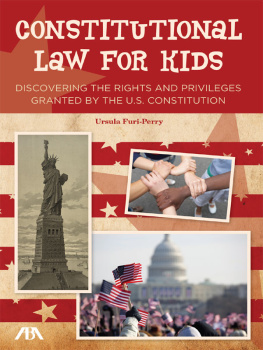
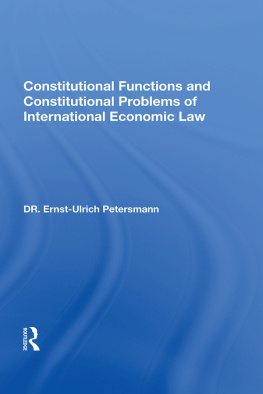
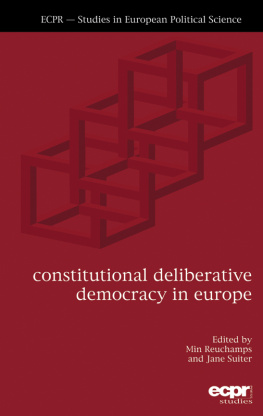
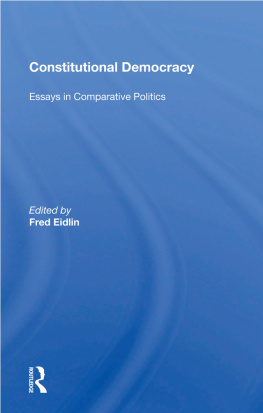
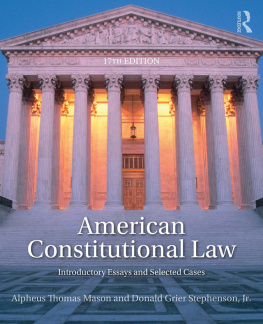
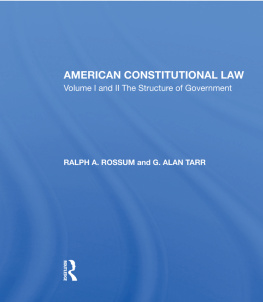
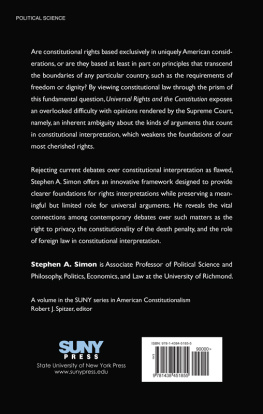

 The paper used in this publication meets the minimum requirements of American National Standard for Information SciencesPermanence of Paper for Printed Library Materials, ANSI/NISO Z39.48-1992.
The paper used in this publication meets the minimum requirements of American National Standard for Information SciencesPermanence of Paper for Printed Library Materials, ANSI/NISO Z39.48-1992.